Robert Frost: Poems
By robert frost, robert frost: poems essay questions.
What is the "sound of sense," and why does Robert Frost use it in his poetry?
The "sound of sense" is a literary theory in which specific syllables and sounds are used to express the subject of a poem in a visceral way. For example, in the poem "Mowing," Frost selects certain terms (such a "whispering") in order to convey an aural sense of the swishing motion of the scythe as it cuts the hay. Frost is very concerned with the clarity and expression of his poetry, particularly in terms of the topic that he is discussing. By using the "sound of sense," Frost is able to layer additional meaning onto each of his works. Instead of absorbing the meaning of the poem solely through visual means, a reader is able to feel and even hear the meaning of the poem on a deeper level.
Why does Frost choose to write about everyday life in a rural environment? What is the effect of this choice on his poetry?
Frost is a major advocate of "reality" in terms of his poetry as a means of discovering greater metaphysical truths. By writing about everyday life instead of imaginary worlds, he is able to layer the basic meaning of his poems over more metaphorical ideas. For example, a poem about taking a sleigh ride through the woods ("Stopping by Woods on a Snowy Evening") can also be about the threat of death in the changing seasons and the traditional expectations of duty. In this way, his poems may seem to be simplistic on a cursory level, but they are actually multi-faceted in terms of their meaning and appeal. As a result of this choice, Frost allows his readers to become individual explorers in each of his poems. Although the basic meaning of the poem may be spelled out in a clear manner, the reader is left with unending possibilities of analysis and ultimately possesses a greater connection to each poem.
How does Frost use poetic form in unusual ways?
Frost is atypical as a poet because he uses a wide variety of forms and rhyme schemes in his poetry. However, in each case, Frost does not seem to select a specific form simply for the sake of having a difficult form to work with. Instead, he carefully chooses the form that will most clearly express the idea and meaning of his poem. In that way, Frost uses form in the same way that he uses the "sound of sense"; nothing is his poems is coincidental and everything is meant to evoke a certain idea, whether it is the sound of a syllable or the motion of a rhyme scheme. For example, in "After Apple-Picking," Frost creates a specific amalgamation of traditional rhyme schemes and free verse that is meant to illustrate the narrator's constant shifting between dreaming and waking. This also allows the reader to feel the same shifting of consciousness as the narrator while they are reading. The fact that Frost is able to execute each form flawlessly, even while using it to express the meaning of his poems, reveals the extent of his literary talent.
How did Frost's personal life influence his poetry?
Because Frost's poems are based on everyday events, many of his works are largely autobiographical. Even two of his most famous poems, "Mending Wall" and "Stopping by Woods on a Snowy Evening," are based on specific events in his life. In many cases, Frost was able to draw inspiration from his own life for his poems and then incorporate more metaphysical themes to give each event a deeper meaning. In addition to using life events as inspiration, Frost also used many aspects of his emotional side in his poetry, such as his life-long depression, loneliness, and sadness at the deaths of so many of his family members. Because Frost places so much of himself in each of his poems, they have a personal touch that makes them particularly appealing to the reader.
How does the familiarity of Frost's poems affect an analysis of their meaning? Is it better or worse that they are well-known?
Some of Frost's poems are so famous that it can be difficult to create an individual analysis of their meaning. The poems "Mending Wall," "The Road Not Taken," and "Stopping by Woods on a Snowy Evening" have been studied in so many high schools and colleges that, in some ways, it may seem as if further analysis is impossible. However, this level of familiarity can also be beneficial because it forces the reader to go beyond the basic analysis that has already been established. Since so many people have read these poems, new readers must force themselves to think deeply about Frost's intentions and challenge themselves to reveal yet another layer of meaning.
How does Frost discuss the importance of communication in his poems?
Communication is an issue that appears in several of Frost's poems as a dangerously destructive force. In "Home Burial," for example, Frost introduces two characters whose inability to communicate eventually destroys their marriage. Each character expresses their own view about the death of their child, but only the reader is able to understand each side of the argument; the husband and wife are unable to communicate directly with each other. In this way, the reader is left with the agonizing truth that the husband and wife are speaking different languages, and that the rift in their marriage can never be healed. If their child had not died, the couple might have been able to save their relationship, but the unfortunate tragedy required a level of communication that was not possible. In Frost's poems with an isolated central character, there is a similar emphasis on communication as a saving force that is denied. For example, the old man in "An Old Man's Winter Night" and the depressed narrator in "Acquainted with the Night" are both unable to communicate with those around them and save themselves from their loneliness: the old man cannot make verbal noises, while the depressed narrator is unwilling to make eye contact with the watchman. In each of these cases, communication plays a far more important role than anything else; communication with other human beings would be enough to save any of these characters if they would only allow it.
What are some of the American ideals that are explored in Frost's poems?
Considering his background in the rural communities of New England, it is not surprising that Frost incorporates numerous American ideals and traditions into his poems. One of these primary ideals is the importance of hard work above all else. For the farmers in "Mowing" and "After Apple-Picking," hard work is necessary for survival, but it also creates a unique satisfaction that cannot be felt from the trivialities of imagination. Hard work is tangible and directly linked to an individual's success and happiness in America. Frost highlights the proud idealism of this mentality, even while discussing the loss and tragedy that hard work can occasionally cause (such as the death of the young boy in "Out, Out--"). Another traditional American ideal that Frost emphasizes in his poems is the concept of duty. In "Stopping by Woods on the Snowy Evening," the narrator wishes that he could stay in the woods to watch the snow fall, but he remembers his responsibilities to those around him. Rather than indulging in his own desires, the narrator fulfills his duties to his family and to his community and makes the necessary sacrifices for their well-being.
What is the role played by God and religion in Frost's poetry?
The figure of God does not appear in the majority of Frost's poetry. Instead of traditional religion, Frost seems to have a more transcendental approach toward the issue of faith, specifically in terms of mankind's relationship to nature. There are times when Frost does suggest the presence of a higher power (such as in "Birches"), but even those references are largely metaphorical and hint at a personal relationship between the individual and the freedom of nature. In "Choose Something Like a Star," Frost takes a rather ironic position on the existence of God and quips about humanity's need to find comfort in a higher power. However, there is not an overwhelming sense that Frost has atheistic beliefs. Instead, he seems to promote a more everyday religion, one that highlights traditional American values such as hard work, duty, and communication.
Which of Frost's poems do you think is the most effective in terms of form and meaning? Why?
The answer to this essay question is highly individual, but there are certain poems in Frost's oeuvre that are particularly dramatic and powerful. One such poem is "Fire and Ice," which is far more compelling than one would imagine, given the length of the piece. The poem does not have a single extraneous syllable, yet Frost is still able to take the age-old question of the world's fate and instantly transform it into a metaphor about the emotional destruction of a relationship from either desire or hate. The equally concise poem "A Patch of Old Snow" follows a similar pattern, with Frost creating a comparison between snow and an old newspaper as a way to broach the larger topic of the loss of the past. Frost's ability to inspire a vast range of emotions and metaphors in only a few lines speaks to the potency of these poems.
Does Robert Frost deserve the praise that he has received for his poetry? Why or why not?
This question is challenging because Frost's poetry has become so ingrained in American culture that it is hard to imagine the effect that it had when it was first published. Poems such as "The Road Not Taken" and "Mending Wall" have been repeated ad nauseum by high school English teachers and graduation speakers, so much so that it is sometimes impossible to view the poems with fresh eyes. At the time of its publication, Frost's poetry - inspired by everyday life and using a variety of poetic techniques - was unique and completely American. He created a literary canon in which the struggles and triumphs of real people were elevated to the level of high art; even the most simplistic activity could contain a deeper metaphysical meaning. Ironically, Frost's successful creation of the rural American genre of poetry could be what makes him seem irrelevant in today's society: the sense of American "reality" that he revealed in his poetry has become such a fundamental part of the American sensibilty that Frost's poetry seems almost simplistic. Although people find flaws in Frost's style and choice of topic, he is still worthy of praise as America's unofficial poet laureate for having created a new approach to poetry in America.


Robert Frost: Poems Questions and Answers
The Question and Answer section for Robert Frost: Poems is a great resource to ask questions, find answers, and discuss the novel.
Robert Frost as a poet Symbolisms
This is a really detailed question for this short answer space. Nature is Frost's main motif for symbolism. Frost is intetrested in the cycle of life and death shown through the seasons in a way that people can connect with. There is also the idea...
Relationship between man and woman?
In Frost's poems (particularly after 1914), he focuses on the trouble men and women have within their intimate relationships and examines the reason why many of these relationships have stagnated.
You might want to check out Gradesaver's theme...
Discuss the theme of the poem "The Road Not Taken" written by Robert Frost.
The central theme of "The Road Not Taken" revolves around the significance of human choice. Through its tone, language, and structure, the poem is able to offer multiple understandings of what it means to choose. The first interpretation of choice...
Study Guide for Robert Frost: Poems
Robert Frost: Poems study guide contains a biography of poet Robert Frost, literature essays, quiz questions, major themes, characters, and a full summary and analysis of his major poems.
- About Robert Frost: Poems
- Robert Frost: Poems Summary
- "Mending Wall" Video
- Character List
Essays for Robert Frost: Poems
Robert Frost: Poems essays are academic essays for citation. These papers were written primarily by students and provide critical analysis of Robert Frost's poems.
- Nature Imagery in the Works of Robert Frost
- Robert Frost in England - A Short Biography
- An Explication of Mending Wall By Robert Frost
- The Most of It
- "Eternal Freshness of the Flawless Poem:" Why Frost's Poetry Remains Vital
Lesson Plan for Robert Frost: Poems
- About the Author
- Study Objectives
- Common Core Standards
- Introduction to Robert Frost: Poems
- Relationship to Other Books
- Bringing in Technology
- Notes to the Teacher
- Related Links
- Robert Frost: Poems Bibliography
Wikipedia Entries for Robert Frost: Poems
- Introduction
Home — Essay Samples — Literature — Robert Frost — What Inspired Robert Frost to Write Poetry: Unveiling the Influences Behind His Masterpieces
What Inspired Robert Frost to Write Poetry: Unveiling The Influences Behind His Masterpieces
- Categories: Inspiration Poetry Robert Frost
About this sample

Words: 711 |
Published: Dec 17, 2024
Words: 711 | Pages: 2 | 4 min read
Table of contents
The influence of nature, personal experiences shaping his work, the literary landscape influencing frost, cultural context: america at the turn of the century, a legacy that inspires.
- Frost, Robert. "The Poetry of Robert Frost." Edna Earle Luiggi (New York: Holt Rinehart & Winston).
- Sewell Jr., David A., "Robert Frost: A Biography" (New York: HarperCollins).
- Baker,Carl J., “The Art Of Robert frost” (Bloomington: Indiana University Press).
- Pritchard,Wright,”Robert frost And The Challenge Of Modernity” (London : Macmillan ).
- Miller,Julius P., “American Poets 1880-1945” (Boston: Houghton Mifflin Company).

Cite this Essay
To export a reference to this article please select a referencing style below:
Let us write you an essay from scratch
- 450+ experts on 30 subjects ready to help
- Custom essay delivered in as few as 3 hours
Get high-quality help

Verified writer
- Expert in: Life Literature
+ 120 experts online
By clicking “Check Writers’ Offers”, you agree to our terms of service and privacy policy . We’ll occasionally send you promo and account related email
No need to pay just yet!
Related Essays
5 pages / 2268 words
2 pages / 1035 words
3.5 pages / 1490 words
6 pages / 2830 words
Remember! This is just a sample.
You can get your custom paper by one of our expert writers.
121 writers online
Still can’t find what you need?
Browse our vast selection of original essay samples, each expertly formatted and styled
Related Essays on Robert Frost
Robert Frost was born in San Francisco, California in 1874, a lesser-known fact about the renowned poet. Despite his early years spent in small apartments in the city, Frost is most commonly associated with the natural [...]
Robert Frost's poem "Mending Wall" is rich in symbolism, as the poet uses various elements to convey deeper meanings and themes. One of the key symbols in the poem is the wall itself, which represents barriers and divisions [...]
Robert Frost’s poem "Mending Wall," first published in 1914, is often interpreted as a commentary on the human tendency to erect barriers, both physical and metaphorical, between themselves and others. The poem explores themes [...]
Robert Frost’s poem “Mending Wall” is one of those works that seems deceptively simple at first glance. You read it, and you might think, “Oh, it’s just about two neighbors fixing a wall.” But if you dig a little deeper, you’ll [...]
Robert Frost was one of the greatest poets if not the greatest poet to ever live, but his life was not always easy; he had to face many struggles. After graduating from Harvard, Frost became school teacher with a salary of just [...]
Frost is known for his realistic depiction of rural life and his command over American Colloquial Speech. He frequently wrote about settings in Rural life in New England in the early 1900's and using them to examine complex [...]

Related Topics
By clicking “Send”, you agree to our Terms of service and Privacy statement . We will occasionally send you account related emails.
Where do you want us to send this sample?
By clicking “Continue”, you agree to our terms of service and privacy policy.
Be careful. This essay is not unique
This essay was donated by a student and is likely to have been used and submitted before
Download this Sample
Free samples may contain mistakes and not unique parts
Sorry, we could not paraphrase this essay. Our professional writers can rewrite it and get you a unique paper.
Please check your inbox.
We can write you a custom essay that will follow your exact instructions and meet the deadlines. Let's fix your grades together!
Get Your Personalized Essay in 3 Hours or Less!
We use cookies to personalyze your web-site experience. By continuing we’ll assume you board with our cookie policy .
- Instructions Followed To The Letter
- Deadlines Met At Every Stage
- Unique And Plagiarism Free
Martyn Crucefix
Blogging on poetry, teaching and translation – over 36,000 views in 2023 – 'one of the top 10 poetry blogs' (rogue strands), the meaning of robert frost’s ‘the figure a poem makes’.
Written in 1939, Robert Frost’s essay is combative, ironic, cryptic, delightful, damning of scholars and, for aspiring poets, encouraging of both a formal awareness and a cavalier attitude. The Figure a Poem Makes talks of the experience of writing rather than reading and the resulting poem is first described negatively (what it is not) then more positively in the famous phrases that it is a “momentary stay against confusion”, that it begins “in delight and ends in wisdom”. Along the way, Frost images the poet as giant, lover and grasshopper. Like most of his comments on poetry, the essay does not develop in a scholarly way, but there is an underlying coherence and in what follows I hope to track it down. You can read Frost’s full text here . I have also posted a discussion of Frost’s poem ‘A Soldier’ and of the poem ‘Two Look at Two’.
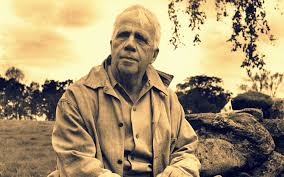
Paragraphs 1-3
Frost opens in the middle of a battle against what he calls “abstraction”, long accepted as part of philosophic method but now – in the first half of the 20 th century – “a new toy” in the hands of poets. This idea occupies the opening 3 paragraphs of the essay. It is the temptation to separate out the constituent elements of a poem and to elevate or prioritise one over all others. Frost’s faux-infantile tone here suggests he will not be offering any approval of this method (“Why can’t we have any one quality of poetry we choose by itself? . . . Our lives for it.”). He floats the idea of focusing only on the sound a poem makes – “sound is the gold in the ore”. He’s thinking of the experiments in sound of a Mallarme, a Tennyson, or a Swinburne, the lush aestheticism of a few years before. It may also be relevant that, in the UK, Dylan Thomas’ early work had appeared in the mid-1930s.
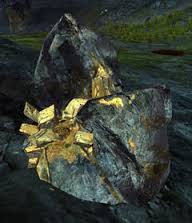
But Frost’s doubts about such approaches to poetic composition take a surprising form. From the premise that “the object in writing poetry is to make all poems sound as different as possible from each other” he argues that a reliance solely on linguistic and formal elements (“that of vowels, consonants, punctuation, syntax, words, sentences, metre”) is never going to be enough to achieve this aim. If we abstract for use only the sonic and formal elements of poetry, “[a]ll that can be done with words is soon told”. Frost is known for his interest in form (as against other Modernists’ scepticism about it) so it’s with some surprise that we hear him say: “So also with metres – particularly in our language where there are virtually but two, strict iambic and loose iambic. The ancients with many [more varieties of metre] were still poor if they depended on metres for all tune. It is painful to watch our sprung-rhythmists straining at the point of omitting one short from a foot for relief from monotony”.
With this Frostian chuckle, it’s clear that only monotony results from this approach and also that the poet can only gain relief from it with “the help of context-meaning-subject matter”. This clumsy, composite term is quickly honed down to the single word “meaning” (later in this essay he uses “theme” and “subject” to refer to the same thing). This is Frost’s argument against the lure of abstraction. The poet – even merely to achieve poems which sound as different as possible from each other – must have something to say, must mean something. The limits of pure sound/form can be breached once meaning is played across the sonic/formal qualities of language. For me this gives rise to images of a jazz soloist improvising across the rhythms of a band. For Frost: “The possibilities for tune from the dramatic tones of meaning struck across the rigidity of a limited metre are endless. And we are back in poetry as merely one more art of having something to say”.
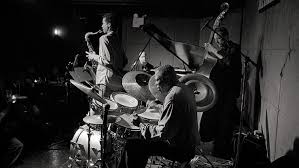
The third paragraph opens: “Then there is this wildness whereof it is spoken”. The quasi-Biblical turn of phrase here suggests irony is again at work and it is a second form of abstraction that Frost is mocking. The “wildness” of a poem is the way its component parts are related – or not – to each other. He mocks the kind of “Poem” – note the ironic upper-case – that results from those who seek “to be wild with nothing to be wild about”. Though the sudden switches of focus, the jump-cuts of strong emotion, the leaps and gulfs of epiphanic moments are certainly (Frost implies) part of great poetry, the Modern(ist) abstractionist will want the leaps and jumps “pure”. Frost is again concerned about the lack of “context-meaning-subject matter” in this kind of poetry. He is taking aim at Surrealism with its reliance on irrational leaps, its dislocation of the senses, the shock value of the illogical. For Frost such practices lead only “to undirected associations and kicking ourselves from one chance suggestion to another in all directions as of a hot afternoon in the life of a grasshopper”. To create poetry that has something to say, Frost suggests for the second time that “Theme alone can steady us down [. . .] a subject that shall be fulfilled”.
Paragraphs 4–6
The essay now moves away from the constituents of a poem to the process of its writing, a process Frost sees as organic, instinctive, unpredictable, exploratory, holistic, and – like love – an experience and source of pleasure. This is where he uses the title phrase and the figure of a poem turns out to be ‘the course run’ by the poem, its track or trail or locus. The elliptical sequencing of the next few paragraphs doesn’t help the reader but Frost considers 5 areas: the poem’s origins, its development, its impact on writer and reader, the importance of the poet’s freedom.
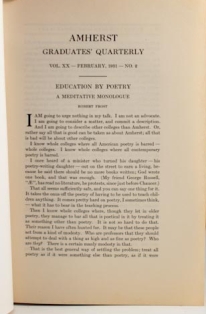
The delight with which a poem begins is “the surprise of remembering something I didn’t know I knew”. I don’t think this need be a literal recalling (on this Frost is not Wordsworth) but an insight or sensing of a connection between things which has a familiarity and feels like a remembrance. (The way in which metaphor is at the root of poetry and, perhaps, all knowledge is a point Frost developed in ‘Education by Poetry’ (1931)). The substance of this initial insight is what constitutes at least the beginnings of the “context-meaning-subject matter” so essential to any successful poem. All poets will recognise such a moment as Frost describes: “I am in a place, in a situation, as if I had materialized from cloud or risen out of the ground. There is a glad recognition of the long lost and the rest follows.” But from such momentary delight and recognition (which will be accompanied by powerful emotions, even tears), Frost makes it clear the process, the figure , of the poem’s making, still lies ahead and is one of surprise and discovery.
As the poem struggles to exist, the poet must remain alert and watchful to what may help build it as “it inclines to the impulse, it assumes direction with the first line laid down, it runs a course of lucky events”. It is a fundamentally metaphorical process of making connections, often quite unforeseen ones: “The impressions most useful to my purpose seem always those I was unaware of and so made no note of at the time”. In a striking image, Frost suggests we are like giants, drawing on elements of previous experience and hurling them ahead of us as a way of paving a pathway into our own future. We make sense of what we encounter by reference to what we have experienced in the past. It’s in this way that a poem is able to result in “a clarification of life – not necessarily a great clarification, such as [religious] sects and cults are founded on, but in a momentary stay against confusion.” Our pathway ahead is illuminated, even if only briefly, by the ordering and landscaping the poem creates towards future experience by reference to what we already know.
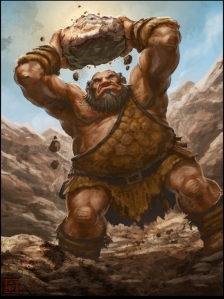
This is why Frost teasingly argues the logic of a good poem is “backward, in retrospect”. What it must not be (and he has his earlier abstractionist targets in mind again) is pre-conceived or imposed before the fact (even if what we pre-impose is the illogical kicking ourselves from one chance suggestion to another). Such willed pre-conception can never yield anything other than a “trick poem”. It is not a prophecy, but rather something “felt”, a feeling figure, an emotional response involving both past and future and it must be “a revelation, or a series of revelations, as much for the poet as for the reader.” The crucial role of emotion is perhaps easily missed. And to allow the role of the passions, Frost insists on the greatest freedom of the poetic materials to move about, to be moved about, to establish relations regardless of time and space, previous relation, and everything but affective affinity. This is Frost’s answer to one of the writer’s constant quandaries: how true to the original experience must I be? For Frost, truth to the emotional response at the inception of the poem (not necessarily the original incident’s emotional charge) is key and that demands artistic independence and freedom. Some distance is required.
Paragraph 7
The essay comes to concentrate finally on the necessary freedoms of the poet. The artist’s freedom is the freedom to raid his own experiences: “All I would keep for myself is the freedom of my material – the condition of body and mind now and then to summons aptly from the vast chaos of all I have lived through.” It’s in this freedom that Frost contrasts scholars/academics and artists. Scholars work from knowledge. But so do artists – this is the point of the early paragraphs of the essay. But the two groups come by their knowledge in quite different ways. Scholars get theirs via a conscientious and thorough-going linearity of purpose. Poets, on the other hand, acquire theirs cavalierly and just as it happens, whether in or out of books. Poets ought to “stick to nothing deliberately, but let what will stick to them like burrs where they walk in the fields”. Poets do not learn by assignment, Frost says, not even by self-assignment.
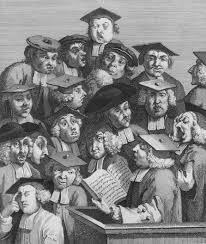
In the course of the figure a new poem may be making, the poet must assert his liberty to work in a dramatically metaphorical way, to be possessed of both “originality” and “initiative” in order to be able to snatch “a thing from some previous order in time and space into a new order with not so much as a ligature clinging to it of the old place where it was organic”.
Frost concludes with another vivid image of the poem making its figure in the course of composition. “Like a piece of ice on a hot stove the poem must ride on its own melting.” The aptness of the image lies partly in the ice’s gradual vanishing (what a poem can offer is only ever “momentary”) and the frictionless quality reflects Frost’s insistence that a poem cannot be “worried into being” through pre-conceived effortfulness. The ice’s movement is generated and facilitated by its own process of melting and the poem too must propel itself (not be propelled by the artist). The resulting figure follows an unpredictable and fresh course, the links it draws from both past and present towards the future offering temporary clarifications of all three for the poet and (something Frost does not explore here) perhaps finally broadcast, available and effective for its readers too.

Share this:
8 thoughts on “ the meaning of robert frost’s ‘the figure a poem makes’ ”.
Dear Martyn,
A wonderful untangling of Frost’s sometimes gnomic instruction, thank you.
Robert Pinsky teaches his class to take a word for a title, then to brainstorm words that come to mind and group them by sound and looking it over, try to connect the words in odd ways. The goal is to get in touch with the elusive unconscious, so a little like play. Surprise and delight.
I’ve interpreted that piece of ice on a hot stove riding on its own melting to indicate that the form of a poem enacts its own dynamic, its own content. Many modern poems express wildness by wildness of structure, a little like modern architecture: sometimes too wild, too willed.
Thanks Bert – yes, gnomic is about right. The cryptic wisdom of the New England farmer – or the type Frost liked to play at.
Thanks very much for this excellent piece.
[…] recently posted a discussion about Robert Frost’s brief essay ‘The Figure a Poem Makes’. In this post I’m looking at one of the poems I’ll be teaching next year from the Cambridge […]
[…] have recently posted about Robert Frost’s brief essay ‘The Figure a Poem Makes’ as well as on one of his lesser known poems, ‘A Soldier’. The latter is one of the poems I’ll […]
[…] Auden refers us to Virgil’s Eclogues, and poets like Campion, Herrick and Mallarme (I’d add other assorted Surrealists, Dylan Thomas, John Ashbery). In being turned away from historical reality, there is inevitably a […]
[…] earlier post in which I talked my way through Frost’s essay ‘The Figure a Poem Makes’ has proved to be one of my most visited pieces. As both teacher and poet, I wanted to explore […]
[…] “When I looked at this poem again today, I remembered and revisited a brilliant summary of Robert Frost’s essay The Figure a Poem Makes, by Martyn Crucefix available to read on Martyn’s website, here. […]
Leave a comment Cancel reply
Poetry and Flash Fiction
Recent Poetry
Books reviews with the occasional interview thrown in for good measure
Writing on Nature & the Ecological Crisis
Translations Reviewed by Translators
Committed to delivering the best possible product for an author
Well Chosen Words
words, images and musings on life, literature and creative self expression
Writing, Poetry & Creativity | Angela T Carr, Dublin, Ireland
WELCOMING AND SUPPORTING REFUGEES, ASYLUM SEEKERS, AND MIGRANTS IN OUR COMMUNITY
Poet, writer, translator
Sharon Larkin's poetry news, views, reviews and translations
Site for art, poetry and performance.
The latest news on WordPress.com and the WordPress community.
Spinning inclusive stories since 2012
reviews and reflection
A Literary Review
Projects and news from UK writer Jo Bell

- Already have a WordPress.com account? Log in now.
- Subscribe Subscribed
- Copy shortlink
- Report this content
- View post in Reader
- Manage subscriptions
- Collapse this bar
- “The Road Not Taken” by Robert Frost
- “The Road Not Taken” Poem by Robert Frost
- Robert Frost “The Road Not Taken” Literature Analysis
- Robert Frost’s “The Road Not Taken” Poem Explication
- “The Road Not Taken” by Robert Frost: Advice for Life
- The Road Not Taken
- Comparing Robert Frost’s Poems: The Road Not Taken and A Question
- “The Road Not Taken” and “When Death Comes” Poems Comparison
- “The Raven” and “The Road Not Taken” by Poe and Frost
- Symbolism in Ozymandias by P.B. Shelley, The Sick Rose by W. Blake, The Road Not Taken by R. Frost
- “The Road Not Taken” by Frost
- Robert Frost’s Writing Style Essay
- The life of Robert Frost
“The Road Not Taken” by Robert Frost Essay
1. Robert Frost is the prominent poet of American literature. His lyrical poems are saturated with philosophic vision of a human life. The poem “The Road Not Taken” by Robert Frost expresses the uncertainty and finality of choice. The poem is rich with symbolism, which is open for interpretation of the reader. The aim of this essay is to evaluate this poem through poetic analysis, and reveal its message.
2. Kennedy and Dana (2010) discussed the symbolism of this poem in their book. The following analysis is based on Frost’s poem, presented in their book. Evaluation of any poem seems to be impossible without the analysis of its sound devices and figures of speech. The analysis helps to understand the message of the poem and realize the author’s vision of the world. The poem “The Road Not Taken” gives an opportunity to deepen into the main theme: the uncertain human nature and problem of choice.
2.1. One may note that the poem’s rhythm and structure provide clues to the overall meaning. First of all, it is necessary to understand the rhyme of the poem. Each of four stanzas of “The Road Not Taken” consists of five lines (the scheme is ABAAB). Lines have four syllables (iambic tetrameter). The rhyme is strict; however, the last line is an exception: “And that has made all the difference” (Frost, 20). In the word “difference”, the stress is on “-ence”.
The poem’s rhyme emphasizes on the words that create the message; thus, one should pay attention to the following sound devices. For example, in the first stanza, assonance (“wood”, “stood”, “looked”, “could”; “both”, “roads”) gives an opportunity to catch the following information, concentrated in these words: a person stood in the wood, looked on the both roads, and considers which road to chose, realizing that it is a quite difficult task (Frost, 1, 2, 3, 4).
In the same time, the first line “Two roads diverged in a yellow wood” deepens a reader into the poem’s setting (Frost, 1). The whole poem is not a situation but person’s reflection of the setting: there are two roads, and only one of them can be chosen, and it does not matter whether it will be right or not. The euphony facilitates the process of absorbing into the poem, and allows to experience with the narrator the problem of choice.
The figures of speech contribute to the imagery of the poem. For example, the epithets “just”, “fair”, “grassy”, describe the road, chosen by the narrator (Frost, 6, 8). Such symbolic metaphor like “roads” (Frost, 1, 18) suggests an idea of human lifelines or the ways which one chooses in life to follow. Also, the symbolic epithet “less traveled” means that the road is full of challenges (Frost, 19). All the people encounter this dilemma.
2.2. The title of the poem focuses the reader’s attention on the road that is not taken by a person. Without gain, there is no loss. The narrator wants to show that life does not have a right path: there is only other path and chosen one. It is evident, that the poem has a philosophical view on a human choice in life.
Symbolism of the poem, expressed by the road-metaphor and other elements, contributes to Frost’s perception of the world: a human being may choose only one road to follow; for this reason, decision can be a difficult process, because everyone realizes that one day, one may regret of the choice made. The roads “equally lay” mean people are free to make a choice (Frost, 11).
Also, there is an irony that can be seen in the following lines: “I shall be telling this with a sigh/ Somewhere ages and ages hence” (Frost, 16, 17). The narrator anticipates the wrongness of the decision in his future, and realizes that betrayal of the moment of decision is inevitable. Once, he will sigh with remorse, and recollect these roads in the wood; nevertheless, sometimes, people can not change the way chosen.
The identity of the narrator is more or less predictable. In the poem, Frost shows his uncertainty in the fork of life. He believes that one should choose one of the roads, but nobody knows for sure whether this choice will be right or not. A reader sees himself in the poem: everyone can be uncertain in making a choice.
For this reason, the mood of the poem is quite sad that can be seen in the following lines: “And sorry I could not travel both”, “Oh, I kept the first for another day!”, “I shall be telling this with a sigh”, “And that has made all the difference”, etc. (Frost, 2, 13, 16, 20). Such words like “sorry”, “sigh”, “difference”, “another day” contribute to the mood of the poem.
3. The significance of the poem lies in its subject matter and theme: human uncertainty in the choice. Frost shows a reader only one of view on this problem; most people can not but agree with the main point. Human experience suggests that there are wrong ways in life, but the poem’s author stresses that one is free which way to follow.
The wrongness of the chosen road will be obvious only in the future; and this he transmits through sad irony. Figures of speech and overall melodic harmony of the poem makes it a unique diamond in American literature. Moreover, it is a thought provoking, psychological and philosophical poem that raises one of the most essential human problems: problem of choice in life.
4. The poem “The Road Not Taken” by Robert Frost remains a valuable heritage of the world literature. Reading this poem, one may realize the problematic and uncertain character of human choice in the fork of life. The author looks at this problem through philosophical and psychological point of view that makes the poem symbolic and significant.
Works Cited
Kennedy, Joe, and Dana Gioia . Literature: an Introduction to Fiction, Poetry, Drama, and Writing. 6 th ed . Harlow, UK: Longman, 2010. Print.
- Chicago (A-D)
- Chicago (N-B)
IvyPanda. (2018, August 15). “The Road Not Taken” by Robert Frost. https://ivypanda.com/essays/the-road-not-taken-by-robert-frost/
"“The Road Not Taken” by Robert Frost." IvyPanda , 15 Aug. 2018, ivypanda.com/essays/the-road-not-taken-by-robert-frost/.
IvyPanda . (2018) '“The Road Not Taken” by Robert Frost'. 15 August.
IvyPanda . 2018. "“The Road Not Taken” by Robert Frost." August 15, 2018. https://ivypanda.com/essays/the-road-not-taken-by-robert-frost/.
1. IvyPanda . "“The Road Not Taken” by Robert Frost." August 15, 2018. https://ivypanda.com/essays/the-road-not-taken-by-robert-frost/.
Bibliography
IvyPanda . "“The Road Not Taken” by Robert Frost." August 15, 2018. https://ivypanda.com/essays/the-road-not-taken-by-robert-frost/.
- To find inspiration for your paper and overcome writer’s block
- As a source of information (ensure proper referencing)
- As a template for you assignment
This website uses cookies to provide you with the most relevant information. Please accept cookies for better performance.
- Annotated Bibliography
- Coursework Writing
- Book Reports
- PowerPoint Presentation
- Capstone Project
- Excel Homework
- Article Writing
- Article Critique
- Blog Article
- Scholarship Essay
- Marketing Plan
- White Paper
- Research Proposal
- Dissertation
- Thesis Proposal
- Proofreading
- IB Extended Essay
- Grant Proposal
- Write My Interview Essay
- Questions-Answers
- Literature Review
- Literary Analysis
- Business Plan
- Research Paper
- Discussion Board Post
- Response Reaction Paper
- Letter Writer
- Questionnaire
- Book Review
- Interview Essay
- Affiliate Program
- Write My Outline
- Rewriting Service
- Problem Solving Essay
- How It Works
- --> --> --> -->